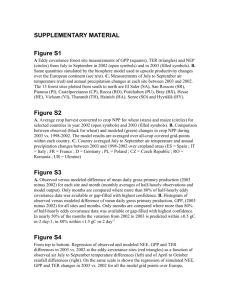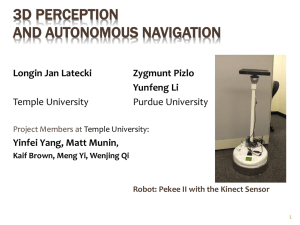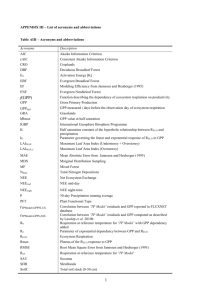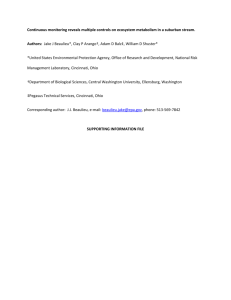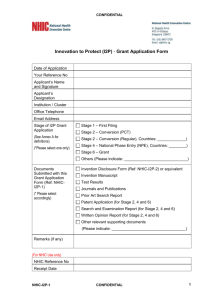GPP Principles Bingo
advertisement
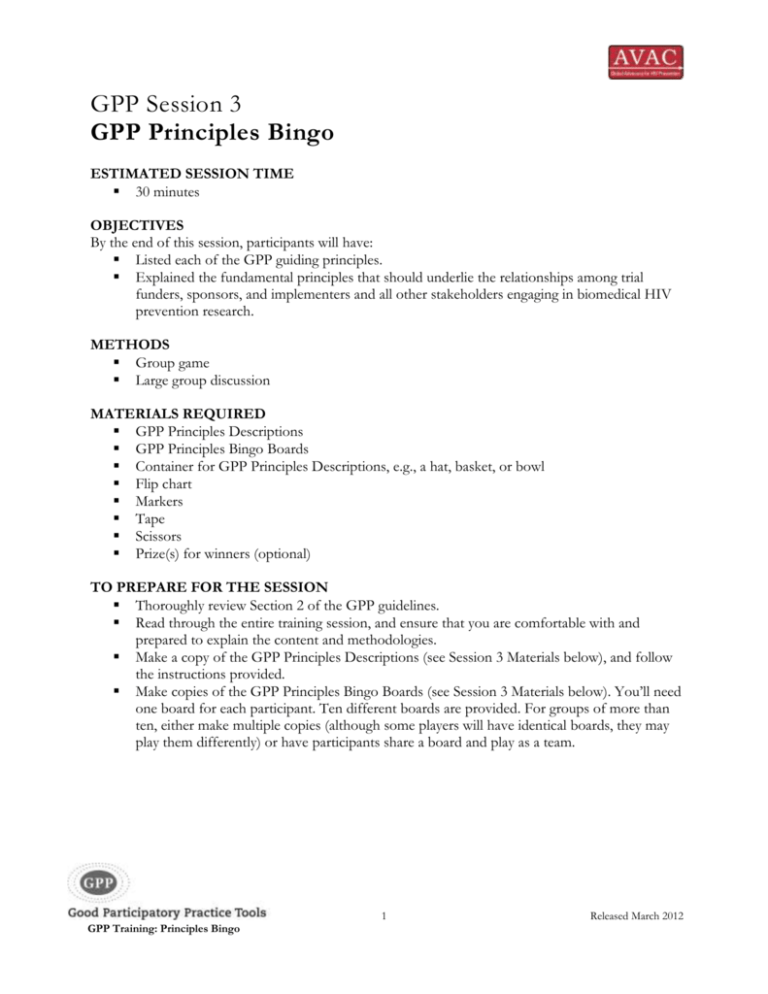
GPP Session 3 GPP Principles Bingo ESTIMATED SESSION TIME 30 minutes OBJECTIVES By the end of this session, participants will have: Listed each of the GPP guiding principles. Explained the fundamental principles that should underlie the relationships among trial funders, sponsors, and implementers and all other stakeholders engaging in biomedical HIV prevention research. METHODS Group game Large group discussion MATERIALS REQUIRED GPP Principles Descriptions GPP Principles Bingo Boards Container for GPP Principles Descriptions, e.g., a hat, basket, or bowl Flip chart Markers Tape Scissors Prize(s) for winners (optional) TO PREPARE FOR THE SESSION Thoroughly review Section 2 of the GPP guidelines. Read through the entire training session, and ensure that you are comfortable with and prepared to explain the content and methodologies. Make a copy of the GPP Principles Descriptions (see Session 3 Materials below), and follow the instructions provided. Make copies of the GPP Principles Bingo Boards (see Session 3 Materials below). You’ll need one board for each participant. Ten different boards are provided. For groups of more than ten, either make multiple copies (although some players will have identical boards, they may play them differently) or have participants share a board and play as a team. GPP Training: Principles Bingo 1 Released March 2012 TO CONDUCT THE SESSION STEP 1: Pass out a GPP Bingo board to each participant, and tell participants that they are going to play a game called “GPP Principles Bingo”, based on the guiding principles discussed in Section 2 of the GPP guidelines. Hold up the container, and explain that each slip of paper inside it has a description of a GPP guiding principle. Tell participants that you will be drawing descriptions from the container, one at a time, and reading them out loud. Those who can name the corresponding GPP principle should raise their hand, and you’ll call on the first person whose hand you see. If their response is correct, all participants should mark the corresponding “principle” on their card with an “X”, filling in only one space at a time. Explain that participants can place an “X” on any square that says “free bingo space”. The first person to form a winning pattern—a straight line horizontally, vertically, or diagonally—should call out “Bingo!” Ask if there are any questions about the instructions. STEP 2: Start the game by drawing the first piece of paper. When a participant offers an answer, ask the other participants for an example of how that principle applies to a situation at their trial site, and facilitate a discussion. Example for Step 2: For the GPP principle “transparency”, a participant response could be as follows: The trial protocol is summarized for CAB members in a way that is easy to understand. . STEP 3: Continue the game until someone wins or all papers have been drawn. STEP 4: Congratulate the winner of the game and all participants for their valuable input. Award any prizes. Debrief by asking for one or two volunteers to share their thoughts about why they think these principles were chosen to be the guiding principles of GPP. Ask the group if there are any outstanding questions or comments and address them as needed. GPP Training: Principles Bingo 2 Released March 2012 Session 3 Materials GPP Principles Descriptions GPP Principles Descriptions Answer Key (For Trainer Only) GPP Bingo Boards GPP Training: Principles Bingo 3 Released March 2012 GPP Principles Descriptions Trainer Instructions: Print pages 4-5, cut along the dotted lines, and fold the individual strips of paper into small squares. Place them in a hat, bowl, or other container for random drawing during the GPP Principles Bingo game. This principle is demonstrated when stakeholders communicate and act in ways that value and honor one another’s perspectives and realities. This is the most basic and essential guiding principle that underlies human relationships, even those outside the context of biomedical HIV prevention research. This principle requires that stakeholders develop competency in understanding socio-cultural issues in a particular location. This principle requires that stakeholders develop competency in understanding research processes. This principle requires adherence to scientific processes so that trials achieve valid results. The ethical aspect of this principle requires consideration of broader societal and ethical issues. This principle means that if stakeholders have questions or concerns about a trial, they should receive clear and understandable information. This principle indicates that research teams make it clear to what extent community stakeholders can contribute to a biomedical HIV prevention trial. This principle indicates that criticism of trials from community stakeholders must be fair and claims should be based on actual deviations from ethical guidance documents. GPP Training: Principles Bingo 4 Released March 2012 This principle indicates that trial funders, sponsors, and implementers are expected to follow participatory practices when they conduct biomedical HIV prevention research. This principle means that research should not be conducted in an area where there is genuine disapproval by key stakeholders about the trial being conducted. This principle states that community stakeholders have the right to support or to refuse trials proposed in their area. GPP Training: Principles Bingo 5 Released March 2012 GPP Principles Descriptions Answer Key (For Trainer Only) This principle is demonstrated when stakeholders communicate and act in ways that value and honor one another’s perspectives and realities. Answer: RESPECT This is the most basic and essential guiding principle that underlies human relationships, even those outside the context of biomedical HIV prevention research. Answer: RESPECT This principle requires that stakeholders develop competency in understanding socio-cultural issues in a particular location. Answer: MUTUAL UNDERSTANDING This principle requires that stakeholders develop competency in understanding research processes. Answer: MUTUAL UNDERSTANDING This principle requires adherence to scientific processes so that trials achieve valid results. Answer: INTEGRITY The ethical aspect of this principle requires consideration of broader societal and ethical issues. Answer: INTEGRITY This principle means that if stakeholders have questions or concerns about a trial, they should receive clear and understandable information. Answer: TRANSPARENCY This principle indicates that research teams make it clear to what extent community stakeholders can contribute to a biomedical HIV prevention trial. Answer: TRANSPARENCY This principle indicates that criticism of trials from community stakeholders must be fair and claims should be based on actual deviations from ethical guidance documents. Answer: ACCOUNTABILITY This principle indicates that trial funders, sponsors, and implementers are expected to follow participatory practices when they conduct biomedical HIV prevention research. Answer: ACCOUNTABILITY This principle means that research should not be conducted in an area where there is genuine disapproval by key stakeholders about the trial being conducted. Answer: COMMUNITY STAKEHOLDER AUTONOMY This principle states that community stakeholders have the right to support or to refuse trials proposed in their area. Answer: COMMUNITY STAKEHOLDER AUTONOMY GPP Training: Principles Bingo 6 Released March 2012 GPP Principles Bingo Board GPP Training: Principles Bingo 7 Released March 2012 GPP Principles Bingo Board GPP Training: Principles Bingo 8 Released March 2012 GPP Principles Bingo Board GPP Training: Principles Bingo 9 Released March 2012 GPP Principles Bingo Board GPP Training: Principles Bingo 10 Released March 2012 GPP Principles Bingo Board GPP Training: Principles Bingo 11 Released March 2012 GPP Principles Bingo Board GPP Training: Principles Bingo 12 Released March 2012 GPP Principles Bingo Board GPP Training: Principles Bingo 13 Released March 2012 GPP Principles Bingo Board GPP Training: Principles Bingo 14 Released March 2012 GPP Principles Bingo Board GPP Training: Principles Bingo 15 Released March 2012 GPP Principles Bingo Board GPP Training: Principles Bingo 16 Released March 2012

